August 2014
Magic in the Moonlight (PG-13)
29/08/14 22:51 Filed in: 2014
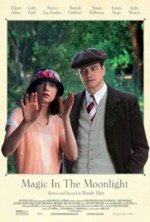
Starring: Colin Firth
August 2014
This review was originally tweeted in Real-time from the back row of a movie theater and appears @BackRoweReviews. Though efforts were made to tease rather than ruin this movie’s memorable lines and moments, some spoilers may exist in the following evaluation. The original tweets appear in black, while follow-up comments appear in red. For concerns over objectionable content, please first refer to one of the many parental movie guide websites. All ratings are based on a four star system. Happy reading!

Watch very closely.
Asian Firth makes an elephant disappear. It’s all part of the show.
Big deal, I once saw David Copperfield vanish a car right in front of me in Vegas.
The great debunker accepts the challenge of exposing a spiritist as a fraud.
Firth meets “a visionary and a vision.”
Hamish Linklater’s (The Crazy Ones) character, who is under the profoundly misguided delusion that he’s actually won Stone’s heart, is so corny you just have to pity him.
Firth’s description of ectoplasm is hilarious.
And completely inaccurate if we’re to believe the science in Ghostbusters. Which, of course, is the authority on the supernatural substance in question, right?
A séance followed by some “hot music.” An average evening.
If you’re the Addams family.
The “agreeable features” exchange is hilarious.
Firth channels Mr. Darcy’s smugness in this scene. With all due respect to Sir Laurence Olivier, nobody played Darcy better than Firth.
Press conference...Firth puts his reputation on the line.
You can guess what happens next.
We’re all part of a greater design. Firth’s prayer is heartfelt...for a moment.
The long take conversation between Firth and his aunt over Firth’s prospects is absolutely brilliant.
This scene is 101 for how to beat around the bush and avoid true feelings. It’s also 101 for great acting and directing.
“Sophie, will you marry me?” One tap for yes.
The first time I saw this “One tap yes, two taps no” system was in the original Star Trek two-parter “The Menagerie,” when crippled Captain Pike used a similar system of flashing lights to communicate to Mr. Spock and company. Obviously this movie is a world away from the final frontier, but this brand of non-verbal communication jogged a memory. No extra charge.
Final analysis: a beautifully filmed period piece with superb performances and a witty script.
The gorgeous location work in France is a tremendous boon to the film…along with period appropriate clothing, cars, observatories, etc.
A clever take on the age-old debate over science versus faith.
And if you know anything about Allen’s beliefs, you’ll know exactly which side of the argument he lands on in the end.
Rating: 3 out of 4. Though predictable and uncomplicated, there’s definitely some movie magic here.
This is the 50th film (according to IMDB and including TV films) directed by Woody Allen. Although he doesn’t appear in this movie, Allen wrote the screenplay (of course) and his signature witty, snappy dialog reigns supreme throughout this tale of unconventional romance, devious motives, shifting convictions, misdirecting mysticism and preternatural prestidigitation. Other than some new stars, Colin Firth and Emma Stone, and the 1920s milieu, the movie is business as usual for Allen. That assertion certainly isn’t a disparagement of the film; if anything, it’s a testament to the consistent quality of Allen’s projects over the years. Other than the production aspects I praised above, my only observation of the movie is how its love story parallels the one in My Fair Lady (1964). Consider: older, refined man paired up with an uneducated ingénue. The man constantly belittles the woman, but is secretly in love with her. The man learns what he’s been missing in life while being drawn deeper into the wonderful mysteries of the woman’s world. The final scenes in both movies are staged exactly the same, and although the reaction of the two men is quite a bit different, the end result is favorable in both cases. This contrivance, along with the criticisms listed after my rating, are the only real drawbacks here. In the end, this is another superlative work by one of the finest auteurs of our time. This film lives up to the charm and enchantment evoked by its title. Although its characters may engage in acts of legerdemain, the story itself has nothing up its sleeve.
If I Stay (PG-13)
27/08/14 23:55 Filed in: 2014

Starring: Chloe Grace Moretz
August 2014
This review was originally tweeted in Real-time from the back row of a movie theater and appears @BackRoweReviews. Though efforts were made to tease rather than ruin this movie’s memorable lines and moments, some spoilers may exist in the following evaluation. The original tweets appear in black, while follow-up comments appear in red. For concerns over objectionable content, please first refer to one of the many parental movie guide websites. All ratings are based on a four star system. Happy reading!

The rock star catches Mia “blissing out.”
Though it’s a completely different style of music from what he plays, Adam (Jamie Blackley) recognizes passion in Mia’s playing…and is inexorably drawn to it and her.
The “guilt and bribery” comment is humorous...and true.
A “wild” date at the symphony.
Don’t worry; very little screen time focuses on the performance. Instead, the audience’s attention is drawn to Adam’s hand, which keeps inching its way toward Mia. Under the circumstances, I suppose that seemed more appropriate than the “mock stretch and place arm over the shoulder” maneuver.
Nurse’s advice to “take control” is a moving moment.
This actress, Aisha Hinds, also plays a caregiver in TVs Under the Dome.
I don’t recall the “How to extract a bee stinger with teeth” procedure in the Boy Scout manual.
Actually, he sucks it out with his mouth, but I worried about how that might translate in a tweet.
The tape job on the chapel ceiling is awful.
But it’s the thought that counts, right? And it’s a very nice thought that pays dividends later in the movie.
Mia creates magic at her audition.
Grandpa, Stacy Keach, watches from the wing. This scene gave me a fit of anxiety because I thought for sure Mia would see her grandfather and allow the distraction to ruin her audition.
Mom’s pep talk is bittersweet.
Some really good dialog regarding the complexity of relationships and some fine acting from Mireille Enos, star of AMC/Netflix’ The Killing.
Grandpa’s conversation with the two Mia’s in the hospital is astounding.
There are many great scenes in the movie, but for my money, this is the finest. Keach turns in a career performance not only in his heartfelt delivery of some very emotional lines but also in how he makes us believe that he’s in tune with Mia’s living spirit. It’s a staggering turn by a skilled artisan. Piggybacking off of his solid supporting role in last year’s Nebraska, I don’t know how the Academy can overlook him for a Supporting Actor nod this year.
I’ve seldom head that kind of reaction to the final scene of a movie.
The movie does end quite suddenly, but I actually liked its resolution. Granted, the theater I was in was composed of about 80% pre-teen/teen girls, so an emotional outburst was to be expected, I suppose. Correction: Heard, not head.
Final analysis: an emotional roller coaster ride filled with teen angst, young love, tragedy and hope.
And a lot of music, ranging from classical to rock…something for everyone.
Rating: 2 1/2 out of 4 stars. Sentimental at times, but a potent reminder of the importance of relationships.
In combination with the similarly themed recent release, The Fault in Our Stars, this movie serves as an effective one-two emotional sucker punch that will see nary a dry eye in the theater. Based on the novel of the same name by Gayle Forman, this twist-of-fate, teen angst tale hits as many emotional notes as Mia (Moretz) does musical ones during her cello performances. Strangely, a recent episode (“Prodigy”) of J.J. Abrams’ cancelled TV series, Believe, featured a remarkably similar premise to the one in this film—a young violin player is traveling with her family to performance when a vehicle in the opposing lane skids out of control, hits her car and claims the lives of her family. This plot is either in the ether or there’s some major artistic appropriation going on. In any event, the scenes at Mia’s house stand out as the movie’s highlight, with the romance, music and accident aftermath elements coming in as a distant second. Though admittedly on the permissive side, Mia’s parents are the kind of non-judgmental, nurturing, encouraging role models that typically raise well-adjusted, highly creative children by being their kids’ biggest cheerleaders. The home scenes radiate incredible warmth and serve as an effective counterbalance to the dire present that awaits Mia at the conclusion of each crosscut flashback. Moretz wholly embodies Mia...she’s really grown as an actress since her Kick Ass days. The film could’ve unraveled into a tangled mass of sentimental schmaltz if not for Moretz’ diligent work at grounding her character in the reality of tragedy…it’s an emotionally complex role and she plays it to perfection. Although it can’t quite be called a teen romance, a melodrama or a weepie, the film flirts with all of the above. While squarely aimed at the teenybopper set, the movie may appeal to some men, if only because of its musical elements. Still, a large percentage of the male audience may find the film’s excessive emotion to be utterly repellant to the degree that they may find themselves being involuntarily drawn to the back door of the theater. Walk toward the light, brothers!
The Giver (PG-13)
21/08/14 23:07 Filed in: 2014
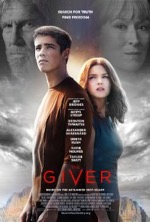
Starring: Brenton Thwaites
August 2014
This review was originally tweeted in Real-time from the back row of a movie theater and appears @BackRoweReviews. Though efforts were made to tease rather than ruin this movie’s memorable lines and moments, some spoilers may exist in the following evaluation. The original tweets appear in black, while follow-up comments appear in red. For concerns over objectionable content, please first refer to one of the many parental movie guide websites. All ratings are based on a four star system. Happy reading!

The Newbery, along with the Caldecott, are the two highest honors in children’s literature.
Don’t be thrown by the B&W, folks. You’ll soon learn why.
The B&W cinematography works on two levels: 1. It effectively depicts the “Sameness” of this ultra-compliant society, and 2. It lends the film a Classical Hollywood look and feel that further reinforces the community’s idealistic, “Leave it to Beaver” veneer.
Streep tells a knee-slapper...literally.
Asher’s assignment in the movie is quite different than in the novel.
It was obvious that effecting such a change would have implications for the movie’s climax…and it does.
Jonas experiences his first blast to the past. Chilling and warm all at the same time.
The visual motif of Jonas looking up into the sky while in motion, employed several times in the film, is indicative of his adventurous and inquisitive nature…something that comes in handy for his job assignment.
Sailing into a sunset. The vibrant colors are a stark contrast to the B&W filming.
Boundary of Memory map.
This is an interesting alteration from the book. Having an actual, physical edge overrides the book’s rather ethereal non-explanation for how the memories would depart the Giver and invade the community’s collective consciousness, but is it scientifically feasible for memories to be constrained to a radius of a few miles? It definitely strains credulity, although, one person serving as the repository for an entire culture’s memories is outlandish from the start.
The Giver gives Jonas a lesson on music and emotion.
Jonas uses an antiquated word.
I have some “precise language” for Jonas’ mom (Katie Holmes), but this is a family friendly blog, so I’ll refrain.
The Release scene is even rougher in the movie than in the book.
It’s one thing to read about an infant being euthanized, it’s quite another to actually see it on the big screen. You can just feel the controversy brewing over this scene.
The Giver gives Jonas strength.
Jonas is lost to the edge.
Bridges and Streep argue over the freedom to choose. Great dialog and acting.
This exchange doesn’t appear in the book; however, it’s a brilliant addition that really secured the rating in my mind. Here are two great actors just going at it, and the collision of communist/socialist vs. capitalist ideologies is the movie’s most salient and pivotal scene.
Jonas crosses the boundary...everything goes technicolor.
A logical visual device to aid the story, but also a knowing nod to Pleasantville (1998)?
Final analysis: a deceptively straightforward story that has much to say about our modern society.
For a teen movie, The Giver has far more biting political subtext than most adult movies…including ones centered on politics.
Rating: 3 out of 4. A cautionary tale that makes commentary on the human condition and the importance of apples.
Now before you go off on a tirade about how the community in this movie is just like the Abnegation faction in Veronica Roth’s Divergent, there’s one thing you need to know…The Giver was written in 1994, seventeen years before Divergent was published. So, if anything, Roth borrowed from Lowry, not the other way around. Even though there are many similarities between both fictional worlds (a focus on teens, a rule dominated society, rite of passage ceremonies, etc), one major difference is that while Divergent is dystopian, The Giver is utopian. Also, Divergent’s Brave New World style segregated society is intended as a cautionary tale (much like the disparate districts in The Hunger Games), whereas The Giver is a political barometer—ranging from communal regulation to individual determination—that reveals the tensions created when the ends tug against the middle. Although both books/movies broach important social messages, it could be argued that The Giver’s metaphysical mystery makes it more compelling than Divergent’s clear-cut clash of castes. Comparisons aside, The Giver stands on its own thanks to director Phillip Noyce’s (Patriot Games) brilliant use of color, or the lack thereof, cinematography in the film and the superb performances turned in by Jeff Bridges, Meryl Streep, Alexander Skarsgard, Katie Holmes and, I kid you not, Taylor Swift. The audience, much like the book’s readership, will be composed mostly of teens and pre-teens, but I sincerely hope that adults show up to see it as well since there’s plenty of meat on the bone for spectators of any age. There are four books in the series, so it’s conceivable that, as with Divergent and The Hunger Games, Lowry’s books will spawn a franchise of its own. If so, her books will prove to be a gift that keeps on giving.
A Most Wanted Man (R)
15/08/14 22:28 Filed in: 2014
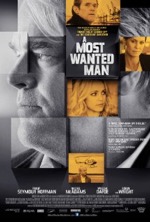
Starring: Grigoriy Dobrygin
August 2014
This review was originally tweeted in Real-time from the back row of a movie theater and appears @BackRoweReviews. Though efforts were made to tease rather than ruin this movie’s memorable lines and moments, some spoilers may exist in the following evaluation. The original tweets appear in black, while follow-up comments appear in red. For concerns over objectionable content, please first refer to one of the many parental movie guide websites. All ratings are based on a four star system. Happy reading!

The book was written by John le Carre, who also penned Tinker Tailor Soldier Spy, which became the basis for the 2011 film of the same name.
Hoffman is being watched by the Americans. Ooo.
The news that he’s being scrutinized by the Yanks inspires such mock fear.
Evidence of torture. A horrific tableau.
I bet McAdams’ character is sorry she asked…I know I am.
The instrument is produced in order to secure a fortune.
One might say it’s the key to the whole plot.
Hoffman looses a foot race. Surprised?
Correction: loses. This one always gets me. If “lose” rhymes with “choose,” why doesn’t it have two “o”s? Darn English language.
The flat is infested with bugs.
The kind that spies use. I don’t think I’m really giving anything away since by now you realize this is a spy movie.
“Unclean money” is given to charity. Guess that redeems it.
When people talk about laundered money that means it’s clean too, right?
An audible is called...Seven Friends Shipping. Gotcha!
From this scene to the end we have ourselves a movie. Too bad the rest of the film is such a snorer.
Final analysis: a slow-boil international espionage yarn with a subtle, powerful performance by Hoffman.
In fact, I’m not even sure the movie would be worth watching without Hoffman in it; with apologies to Rachel McAdams, Willem Dafoe and Robin Wright, who all turn in fine performances in limited roles.
Rating: 2 1/2 out of 4 stars. The German location work is stunning, but the pacing is somnambulating.
As with Tinker Tailor Soldier Spy, this le Carre adaptation is a taut tale with fine acting and directing (The American’s Anton Corbijn) that resembles a chess match more than a Bourne style high-octane actioner. What we have here, then, is a cerebral procedural with little action and even less emotion, save for Hoffman’s f-bomb blitzkrieg during the climax (and really, could anyone employ this particular expletive with as much visceral vitriol as Hoffman?). The climactic action scene is gratifying after waiting so long for something to actually happen in the movie, but it’s too little too late to assist such a stolid story. The European locations are a boon here but can only do so much to spruce up this drab drama, which sees the majority of its scenes told in dimly lit offices that could’ve been filmed anywhere…and probably were. Many will classify this film as a thriller, but that would be a misnomer since there’s absolutely nothing at all thrilling about the methodical, mechanical narrative…however realistic it might be. In the end, this isn’t a terrible film, but it certainly isn’t an exciting one either. It’s just sad that this is one of the final films (only the last two The Hunger Games movies remain on his posthumous filmography) in Hoffman’s tragically abbreviated career. Although his performance is memorable, the film is not.
The Hundred-Foot Journey (PG)
13/08/14 23:07 Filed in: 2014
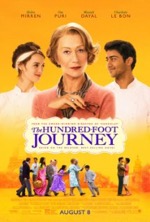
Starring: Helen Mirren
August 2014
This review was originally tweeted in Real-time from the back row of a movie theater and appears @BackRoweReviews. Though efforts were made to tease rather than ruin this movie’s memorable lines and moments, some spoilers may exist in the following evaluation. The original tweets appear in black, while follow-up comments appear in red. For concerns over objectionable content, please first refer to one of the many parental movie guide websites. All ratings are based on a four star system. Happy reading!

Correction: “Hundred Foot” needs to be hyphenated. Relax, it’s not like I messed up the title or anything.
Cooking makes ghosts. An interesting perspective.
One creature must die so that another can live. The circle of life and all that stuff.
The establishing shots of the French village are gorgeous.
The B unit captured some really nice vistas of the village and surrounding countryside.
Mirren visits the enemy’s camp.
Opening night. Establishing a clientele the hard way.
The dog gambit is particularly ingenious…and humorous.
The five French sauces pass the taste test.
The early bird gets the pigeons.
You know what they say about paybacks.
Mirren rejects the peace offering. The war heats up.
Throwing that fine meal in the trash should be a crime.
Mirren makes an omelette...a sumptuous scene.
Hassan makes the titular journey. Learns how to cook classic French cuisine.
Pop the cork...two stars.
Three is the apex; two is superb for a restaurant in a small village.
“Maybe brakes break for a reason.”
In other words, the hand of fate can conspire to bring people together. Then again, maybe they were just old brakes in dire need of repair.
Innovation requires inspiration. Hassan takes a train home.
Final analysis: a delectable clash of cultures film with mouthwatering dishes & a dash of romance.
Rating: 3 out of 4 stars. How could I give it anything else?
Produced by Steven Spielberg and Oprah Winfrey and based on the novel of the same name by Richard C. Morais, this film is a tasty treat for those in the mood for European trappings, fine dining, unassuming romance or all of the above. The film has many quality ingredients, including solid direction by Lasse Hallstrom (Salmon Fishing in the Yemen) and yet another virtuoso performance by Helen Mirren, but what prevents it from getting top marks is the last quarter of the movie. Despite a solid setup, the film settles for a standard resolution, which comes complete with an extra helping of schmaltz. The rags-to-riches story device is undeniably inspirational, but it’s also egregiously sentimental, especially when screenwriter Steven Knight employs various media (magazine covers, news reports, etc) in narrating Hassan’s meteoric rise to the upper echelons of elite chefs in Paris…shameless. Still, some people get off on this brand of emotional catharsis and will surely feel serviced by the story’s feel-good elements. However you slice it though, this kind of movie does a disservice by trading on such populist wish fulfillment. In my estimation, this is three-fourths of a good movie, hence the rating. And yet, even with the overwrought resolution, this film is still a journey worth taking, if only for the exquisite entrees and lush landscapes.
Guardians of the Galaxy (PG-13)
09/08/14 00:20 Filed in: 2014
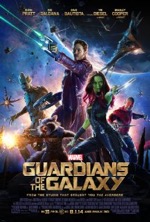
Starring: Chris Pratt
August 2014
This review was originally tweeted in Real-time from the back row of a movie theater and appears @BackRoweReviews. Though efforts were made to tease rather than ruin this movie’s memorable lines and moments, some spoilers may exist in the following evaluation. The original tweets appear in black, while follow-up comments appear in red. For concerns over objectionable content, please first refer to one of the many parental movie guide websites. All ratings are based on a four star system. Happy reading!

It’s called sarcasm, people.
Star Lord uses a rat microphone while jamming to his “Awesome Mix” on muddy Morag.
Maybe it’s just me, but even if I were a Star Lord, I still wouldn’t be handling a rat.
The group hug weapon is highly effective.
A different kind of group hug was used with great success by another band of misfit heroes in Mystery Men (1999).
Groot drinks his fill of fountain water.
Probably a lot cleaner than what he absorbs through his roots.
“Exclusively in that order.” Ha!
Boy, Groot really knows how to pick a nose.
“Asleep for the danger, awake for the money as usual.” Hilarious!
This statement is akin to Han’s deadpan criticism in Return of the Jedi, “Great, Chewie! Great! Always thinking with your stomach.” Correction: “Asleep for the action and awake for the money, as usual.”
Rocket was kidding about the mechanical leg. I haven’t laughed this hard in a movie in a long time.
This gag is the equivalent to the long con in a heist movie. The joke is set up well in advance of the punch line, which lands when least expected. What a payoff!
From warrior to imbecile in less than fifteen seconds.
The Ranger Rick reference is priceless.
I wonder what percentage of the audience even got this gag? Google it!
“Pelvic sorcery.” The jokes just keep coming.
Quill’s “losers” speech is moving if not necessarily motivational.
A nice spin on the word in question that trades on commonality to build solidarity among the group.
The ship net is a cool concept.
Until one part of the net is breached. That’s why Rom’s idea for self-replicating mines in DS9 was so ingenious.
Groot takes out an entire platoon of enemy soldiers with one branch and then grins. Classic!
This scene is similar to Kit Fisto’s smile directly at the camera in Star Wars: Episode II.
Quill gets a second chance to take his mom’s hand.
A touching scene that resolves the nagging guilt Quill’s experienced ever since he was a boy.
Final analysis: unquestionably the funniest superhero movie ever, and also one of the most original.
After watching the trailer, I knew this was going to be a humorous movie, but it’s far, far funnier than I originally anticipated. There were moments when I was literally bellowing and paid no mind to how such loud laughter would affect those around me. Of course, they were laughing just as loud, so no harm no foul.
A little overstuffed, but an effective blend of humor and action.
By overstuffed I mean the Dune-esque epic nature of the story that sees the characters hopping from one planet to the next and encountering myriad alien species along the way, all of them bent on obtaining the movie’s mysterious artifact. As someone who’s never read the comic book, it was a bit of a challenge keeping up with the who’s who element of the story.
Rating: 2 1/2 out of 4 stars. Let’s see what becomes of Groot’s root in the sequel.
While many sci-fi movies contain comedic elements, the genre label “sci-fi/comedy” can be attributed to very few films. Woody Allen’s Sleeper (1973) certainly qualifies, as does Mel Brooks’ Spaceballs (1987) along with the book-to-big screen The Hitchhiker’s Guide to the Galaxy (2005). Often, movies that try too hard to meld comedy into a sci-fi universe end up resulting in a goof-fest like The Ice Pirates (1984). So then, Guardians negotiates some difficult terrain as a sci-fi, superhero, action/adventure and comedy hybrid. Somehow, like a skilled juggler, the film manages to keep all of these balls in the air at the same time, which is fitting since the movie’s MacGuffin, a high-tech orb, is also up in the air (and up for grabs) for much of the movie. Whereas humor and action effectively hold the audience’s attention throughout, the relationships between the motley characters is the glue that holds the whole proceedings together. Chris Pratt imbues Peter Quill/Star Lord with irresistible charm and Zoe Saldana brings a disarming vulnerability to the chip-on-the-shoulder assassin Gamora. Dave Bautista is Drax, the laconic beefcake, Groot (voiced by Vin Diesel) is the good-natured tree creature and Rocket (voiced by Bradley Cooper) is the wisecracking raccoon. Each member of the team receives ample onscreen time, but character development is pretty thin except for Star Lord’s opening back story. The sacrifices made by Star Lord and Groot are genuinely touching—these character moments help to ground the more farcical and whimsical elements of the story. The formula here (distilled from many genre sources ranging from Star Wars to X-Men) seems to be a winning one, so a sequel seems all but assured at this point. Let’s just hope that future films in the franchise retain this movie’s lighter tone. So, until the sequel arrives, grab your walkman and jam out to your own awesome mix (punting rats is optional).
Lucy (R)
02/08/14 22:59 Filed in: 2014
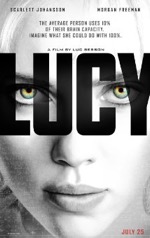
Starring: Scarlett Johansson
July 2014
This review was originally tweeted in Real-time from the back row of a movie theater and appears @BackRoweReviews. Though efforts were made to tease rather than ruin this movie’s memorable lines and moments, some spoilers may exist in the following evaluation. The original tweets appear in black, while follow-up comments appear in red. For concerns over objectionable content, please first refer to one of the many parental movie guide websites. All ratings are based on a four star system. Happy reading!

“Open your mind…open your mind!”
Wait, I thought this was Lucy, not Planet of the Apes.
Or 2001: A Space Odyssey (1968).
The crosscutting between humans and the animal kingdom is a clever conceit.
The National Geographic style nature scenes are a bit jarring at first, but they’re a unique way of depicting the primal side of humanity.
Immortality or reproduction. Why is it too much to ask for both?
Lucy dances on the ceiling.
Oh what a feeling.
Lucy mind-melds with her captor.
Why doesn’t she dispatch with him here and now? Ah, yes, because the villain needs to factor into the climactic showdown. Contrived!
The FX in the airplane bathroom are mind-blowing.
60%. The goons don’t stand a chance.
Maybe at 30% they’d stand a chance, but not at 60%.
A new generation of computer.
This one comes standard with tentacles.
Awesome retro time lapse effects...like watching “The Time Machine” in reverse.
The whole T-Rex thing was a bit staged, yes? I felt like I was in the 3D King Kong attraction at Universal Studios Hollywood.
Lucy meets Lucy.
Shouldn’t the universe implode at this point? Let’s ask Dr. Brown. He’ll know.
Final analysis: an intriguing premise that fails to live up to its groundbreaking promise.
Rating: 2 1/2 out of 4 stars. A thought-provoking sci-fi yarn with some amazing visual effects.
If the average human only uses roughly 10% of her brain, what capabilities would she possess if she could access 100% of her brain? An intriguing question…and a promising premise for this near future sci-fi actioner, which comes complete with all of the highly styled action sequences and pulse pounding chases we’ve come to expect from a movie directed by Luc Besson (The Fifth Element). Unfortunately, this high-concept story takes a radical left turn during the second half of the movie when a Limitless (2011) style cautionary tale morphs into a Transcendence-esque emergence event (the movie also has a heavy quotation of the 1960 version of The Time Machine). Using the above films as the ends of a spectrum, Lucy falls somewhere between Limitless, which is considerably better, and Transcendence, which is an awful mess that makes this film look like Inception (2010) by comparison (coincidentally, Lucy is the second so-so sci-fi yarn Freeman’s done this year…he also appeared in Transcendence). Ironically, just about the time Lucy starts to evolve the story begins to devolve…by the end, we’re left with a plot that’s been reduced to the consistency of a primordial soup, an image not lost on the movie. Aside from a head-scratching denouement (is that a 1 trillion GB flash drive?), the story line involving the Asian drug lord and his minions is extremely banal. Despite the enjoyment derived from watching Lucy surgically annihilating hoards of thugs, none of the fight scenes have any dramatic tension since the end result is a foregone conclusion—the multiple melees are tantamount to a group of Secret Service agents taking on a Jedi. However, if frenetic action scenes are the main motivation behind attending this movie, Lucy will serve its purpose…I suppose. In the end, the movie is a missed opportunity since its central conceit is so easily apprehended and universally applicable and a profound disappointment since its story is so formulaic and predictable. It really chafes that this could’ve been a great movie. Instead, Lucy is just a mildly intriguing action picture with A-list actors and a B grade story that required far less brain power to watch than it did to read this pedantic review.